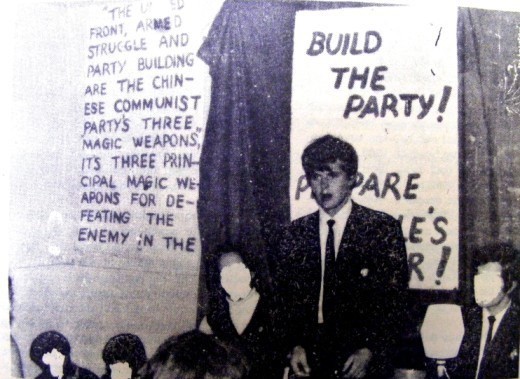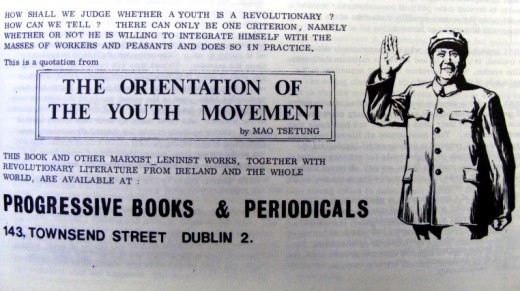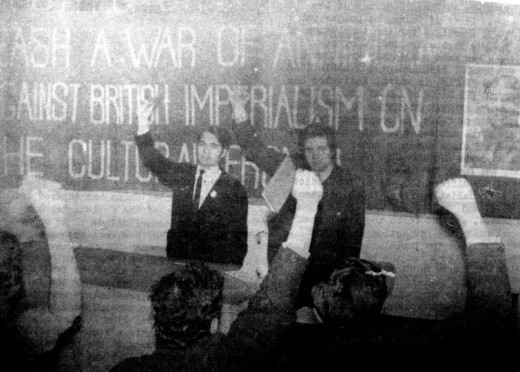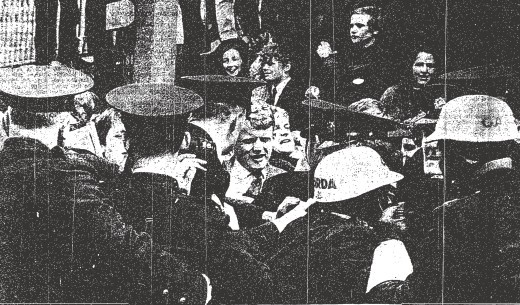The Internationalists/Communist Party of Ireland (Marxist-Leninist), Part One: 1965-1970 Commentary from The Irish Left Open History Project

18th May 2010
When The Internationalists were first set up in Trinity College Dublin in November 1965, it was not as a fully-formed Marxist-Leninist party, but ‘as an exercise in better staff-student relations.’ 1 Prominent among the initial group was Hardial Bains, a lecturer in bacteriology who was originally from India, but who had left for Canada in 1959 and had completed his post-graduate studies in Vancouver at the University of British Columbia. Bains was a former member of the Communist Party of India, having resigned in protest at the party’s endorsement of Khrushchev’s criticisms of Stalin. In March 1963 he founded a political group in Vancouver which was called The Internationalists (later the Communist Party of Canada (Marxist-Leninist), and while the November 1965 TCD group may not have been exactly an Irish version at this stage, the choice of name suggests Bains’ strong input from the start.
External Resources:
- Necessity for Change (1967)
- Red Patriot, issue one, August 1969
- Red Patriot, marking the launch of the CPI (M-L), July 1970
Also among those involved at the early stages of the group were two African students, David Akerele and Koye Majekodunmi, and staff members Kader Asmal (who was then head of the Irish Anti-Apartheid Movement), Professor David Webb (Professor of Botany), Dr. Owen Sheehy Skeffington and Dr. R. B. McDowell . Given such participants it is highly unlikely that The Irish Internationalists were at this stage in any way Marxist, or even socialist.
This loose discussion group held meetings with titles such as “Academic Freedom” and “The Function of a University”, and continued until October 1966, when the decision was taken, presumably by Bains and his supporters, to establish a more disciplined organisation which would focus on ‘which theory we are going to follow, which motivation we should have, which class we are going to favour’ 2.
It was at this stage that people like Asmal, Webb, Skeffington and McDowell began to drift away, leaving Bains as the undoubted central influence.
Sometime towards the end of 1966 the group renamed itself the Trinity Internationalists, and began to issue a periodical entitled Words and Comment. There were at least eleven issues produced between 1966 and 1968, and Trinity’s library has at least seven of them for those privileged enough to have access 3.
In February-March 1967 the Internationalists organised a study programme entitled Necessity for Change, during which Hardial Bains made a speech which became the basis of the Necessity for Change! The Dialectic LIves! pamphlet.
Necessity for Change
‘People do not stop to think that museums, like history itself, are the creation of the ruling class.’
The main thrust of Necessity for Change appears to be towards students and academics, in that its criticisms are of intellectual production, and the intellectual industry, in the Western world. The control of ideas, of history, of ‘common sense’ by the ruling class needs to be challenged, first by a cadre who have un-taught themselves the prevailing ideas and have begun to see the world based on reality rather than the dominant, right-wing, intellectual discourse; then by the working class who will benefit from the intellectual and individual gains made by the cadre once these new ideas, and this new way of thinking, make their way into the working class through the actions of the cadre itself.
Here are some key terms / concepts.
Anti-consciousness – the forced acceptance of a set of values and beliefs which are, in fact, not acquired by the act of finding out but by the act of consciously suppressing any findings which might contravene and contradict the so-called ‘ways of the civilised world’ (p.27). Almost all of us live and think within the realm of anti-consciousness. The job of the Internationalists is to expose this false reality – first to themselves, then to others – and to engage in ‘understanding’ which requires ‘an act of conscious participation by the individual, an act of finding out.’ In other words, we have to break down this false reality which has not only subsumed society’s thoughts but our own as well, and then begin the long, hard struggle of ‘finding out’ by observing the world as it is, not as the ruling class portray it.
Historical crib – “The particular prejudices of a society, transmitted through parents and social institutions, constitute the historical crib into which we are born. Like the womb of the mother, it provides us with everything we need. Our purpose and our goal are defined, that is, how to receive nourishment and how to be grateful for it. The historical crib gives us a perspective with which to look at the world and the people in it, including ourselves. We only see those things, which can be correlated with that perspective. This perspective is the active blindfold of anti-consciousness. Whenever we see through the blindfold we destroy that consciousness by using all kinds of cultural and historical crib-arguments. In other words, we destroy our understanding by camouflaging our experience. The covering up of experience precludes development. Thus we can never grow up and confront the ‘various classes of people who have usurped power by force’ as long as we are unconscious of that historical crib”(pp. 30-31). This historical crib, though, does not serve the needs of the individual, only the ruling class. Nonetheless, its pervasiveness is such that it envelops each individual in a ‘cocoon of loyalty’ from which it is extremely difficult to break. ‘One’s birth requires the destruction of that cocoon, but the self denies itself the will to so so’ (p.33).
Bains warns against people using The Internationalists as a new form of historical crib, ‘a new perspective through which they can rationalise their position in almost all circumstance’ (p.31). Internationalists, true Internationalists, have to be on their guard constantly to avoid this happening.
‘Various classes of people who has usurped power by force.’ – The ruling classes.
History-as-such – history as taught in schools and universities – essentially the history of the ruling class, from the perspective of the ruling class. The common,accepted conclusions of history. ‘It is always about kings and queens, rajahs and maharajahs, sheiks and inmans, warlords and landlords, and their hand-picked agents… People are compelled to learn that history by heart.’ (p.28) Crucially, this history teaches that ordinary people have no role to play in history, that they are powerless to make their own history.
Will-to-be – Despite the best attempts by the ruling class to propagate a hermetically-sealed compliant consciousness, there is a contradiction, a conflict, between the individual and society. There is something inside all of us which is ‘straining to be free in order to see the light… It is a reflection of class struggle going on in our society. This will-to-be is the spontaneous reflection amongst human beings of what they are struggling against in society.’ (p.33)

In April 1967 the group were given temporary use of a cellar in Trinity by the college authorities for the purpose of producing a newspaper for circulation. Four months later, in August, the Internationalists held a conference in London where they discussed their ideas with other elements of the British and Irish left. It lasted for two weeks, and among the groups invited were the Irish Communist Organisation (later the British and Irish Communist Organisation) who were also anti-revisionists. Talks of a merger between the two groups came to nothing, and in fact a serious animosity developed, one which played itself out on the pages of the two groups’ respective publications for the next ten years.
Towards the end of 1967, after the London conference, the Trinity Internationalists start to become more vocal and agitational. Around this time (1967/68) they produced a manifesto which called for reform of the internal structures of Trinity College. According to a highly-partisan article in the Irish Times (14 Jun 1968) entitled ‘A Cranky Set of Outsiders’, Michael Heney said that the Internationalists
… accuse it [TCD] of being a bourgeois-aristocratic educational institution, connected with British colonialism, geared to the reactionary training of students, and giving active support for the ruling and wealthy classes by the inculcation of bourgeois ideas and culture on the students.”
The influence of Necessity for Change! is clear – ‘reactionary training’, ‘inculcation of bourgeois ideas and culture’, ‘active support for the ruling and wealthy classes’ – all central ideas from the discussion group and pamphlet.

Heney goes on:
The group produces an enormous quantity of literature throughout the three academic terms of the year. Words and Comment is their main organ, a weekly publication, but there is also the more occasional Irish Student, and numerous other works, including pamphlets hurriedly produced on the occasion of some issue arising, and volumes containing extensive re-prints from the writings of Chairman Mao, and other Communist leaders.
The previous day (13 June) he wrote that the Internationalists numbered about 30, the majority of whom were foreign students, although at least six were Irish. These included John Dowling from Dublin, Arthur Allen from Drogheda, and Simon Stewart from Belfast.
In 1968 the leader of the Trinity Internationalists was Nick Miller, a final-year natural science student from England. In August of that year he was suspended from the college for failing to sign an undertaking to obey the rules of the college. Miller never returned to complete his studies, but according to Dublin University Climbing Club by 1971 he had left radical politics behind and was working for his father’s company.
According to Nusight, The Internationalists at this time ‘lived communally, shared all their earnings, rose at a certain time for pre-breakfast study sessions, and often worked an 18 hour day bill-posting around the city or stapling magazines.’ 4 It also said that
In the summer of 1968 they burst upon the public consciousness when they protested against the visit to Trinity of King Baudoin of Belgium. There were some minor scuffles with the gardai and right-wing students which attracted scare newspaper headlines and silly editorial condemnation of students in general by the Sunday Independent and the Evening Herald. In 1968 they opened up a bookshop in Townsend Street in Dublin. This attracted a small number of young people of working class background, most of whom were in school. They formed the People’s Rights Group and published an agitational broadsheet of the same name… The bookshop closed late last year (1969) when the lease ran out. Since then the Maoists have opened another bookshop in Exchequer Street. The People’s rights Committee, along with the Maoist students, provided the basis for the setting up last October (1969) of the Irish Communist movement (Marxist-Leninist), the major Maoist grouping at present.

Attempts were made to set up bookshops in Cork and Limerick. The bookshop in Cork was attacked by a crowd one evening, while the bookshop in Limerick was the centre of a scare campaign by Steve Coughlan, the Labour Party’s Lord Mayor of the city. Both events warrant separate posts.
In August 1969 the Internationalists, under the name, Irish Revolutionary Youth, launched a monthly newspaper entitled Red Patriot.
In July 1970, The Internationalists merged with Irish Revolutionary Youth, and formed the Communist Party of Ireland (Marxist-Leninist).
-
Irish Times, ‘Who Are The Internationalists?’, 13 June 1968 ↩
-
Hardial Bains, On the Occasion of the 25th Anniversary of The Internationalists in Ireland (Dublin, 1990, pp.15-16) ↩
-
Trinity Internationalists, Words, Berkeley Stacks – PER 75-457. Publication Date, Nos.4-11(1966-1968). ↩
-
Nusight, ‘The Maoists’, May 1970. ↩
Comments
No Comments yet.
Add a Comment
Comments can be formatted in Markdown format . Use the toolbar to apply the correct syntax to your comment. The basic formats are:
**Bold text**
Bold text
_Italic text_
Italic text
[A link](http://www.example.com)
A link
You can join this discussion on The Cedar Lounge Revolution
By: neilcaff Fri, 21 May 2010 16:13:00
In reply to NollaigO.
The less singing we have to do the better, tbh. 🙂
Reply on the CLR
By: neilcaff Fri, 21 May 2010 16:20:30
It’s says a lot about the left nationalist mentality that the measure of a persons radicalism and commitment is not what you’ve done in the movement but what sort of songs you sing.
Mind you, it’s the first time I’ve ever seen someone quote Harpal Brar and expect to be taken seriously!
Reply on the CLR
By: LeftAtTheCross Fri, 21 May 2010 16:33:47
In reply to neilcaff.
For once I agree with someone in the SP. Where’s MarkP now to start an argument about it…
Reply on the CLR
By: Gerry Ryan (I now accept that I was wrong on most issues) Fri, 21 May 2010 21:32:37
In reply to Hardial Bains (I ain’t dead, I’m just having a break).
Dear Mark P,
The subjective nature of your detached, metaphyscial, one-sided outlook has blinded you even to the absurdity of your own position but I didn’t come on this forum to insult you (that would be too easy).
‘Preparing for People’s War’ is a different matter entirely from advocating, or actually instigating such. As a matter of fact, in the period that is under scrutiny here, 1968/69, there was no threat of armed insurgency or insurrection. So from that perspective, The Internationalist’s standpoint could be described as prophetic. What would you say to the Christian who calls upon followers to ‘prepare for the second coming’? Or the farmer who ‘prepares for the rainy season’? Are these people mad and insane? Do they deserve to be incarcerated in a mental asylum in Dundrum?
In any society, capitalist or socialist, the rich prepare their offensive against the poor. Should not the poor similarly prepare? Should we not all prepare against the offensive that NAMA and the ECB has in mind for us all? If you do not like the term “people’s war” fine, find some other term. But don’t leave yourself hapless and unprepared.
As for your argument that ‘people’s war’ has a ‘fairly precise meaning within Maoist lexicon’ I think you are being somewhat facetious here. Where is this ‘Maoist Lexicon’? Was it written by a Maoist? Are you a Maoist or where you ever a Maoist? Again, it’s like asking a Christian what he/she means by ‘prepare for the second coming’. Would you have such a person arraigned and charged with planning the apocalypse?
Finally, to end on this subject, your description of The Internationalists as ‘Maoist’ is tenuous to say the least. Not to say that Maoism is necessarily a derogatory term. However, it is clear, even from the above synopsis of the history of The Internationalists, that they were not Maoist at their inception. It is true that in their subsequent development they based their outlook on ‘Marxism-Leninism-Mao Tse Tung Thought’. But is is also a matter of historical record that the organisations that proceeded from The Internationalists rejected Mao Tse Tung Thought on the grounds that it was un-Marxist and anti-Leninist.
So I leave it to detached, one-sided, metaphysical idealists like yourself, Mark P, to determine, to what extent The Internationalists were ‘maoist’ (as you like to refer to them as) and to what extent they were Marxist-Leninists, and to what extent they may have belonged to some other school of thought, as yet unidentified.
When I posed the question ‘Did you actually try reading their publications?’ I meant that quite sincerely. Maybe you just thought you read them.
Reply on the CLR
By: PJ Callan Sat, 22 May 2010 07:39:08
“All that glitters is not gold. There is much glitter and sound in Trotsky’s phrases, but they are meaningless.”
VI Lenin
Reply on the CLR
By: Mark P Mon, 24 May 2010 23:32:40
In reply to WorldbyStorm.
Well, the British left does win occasional council seats, Respect, the Socialist Party, the Independent Working Class Association, the SSP and Solidarity have all done so in recent years. But a council seat means a lot less there and with the partial exception of Respect, their general election results have been pretty poor.
I tend to think that Scargill has to shoulder quite a bit of blame for that. In retrospect the SLP was probably the best opportunity the English left had to build a significant electoral presence and Arthur, who I will normally give a free pass to, fucked it up but good. A more structural problem is the electoral system. When freed from its constraints the SSP managed to make a noticeably bigger electoral advance than the Irish socialist left has yet managed. And then screwed it up by waging the incredibly bitter war of Tommy Sheridan`s cock.
As far as the union movement is concerned, the British left is massively stronger than the Irish one. Particularly the British SP and the CPB, which both have some real if limited sway over sections of the union movement there.
Reply on the CLR
By: WorldbyStorm Tue, 25 May 2010 06:43:45
In reply to PJ Callan.
Is cool Bartholomew. 🙂
Reply on the CLR
By: neilcaff Tue, 25 May 2010 15:23:43
In reply to PJ Callan.
Zzzzzzzzzzz
Reply on the CLR
By: WorldbyStorm Tue, 25 May 2010 15:50:17
In reply to neilcaff.
I don’t want to seem snarky about this, but let’s calm ourselves and step back from discussions that are entirely moot.
Given that neither Trotsky nor Lenin, nor indeed Stalin, graced these shores (on either side of the Irish Sea), at least not in the recent past I think it’s pointless to start fighting over next to nothing. I’m also dubious that Lenin was quite as antagonistic to Trotsky as some like to say or that he didn’t change his mind as time progressed. He did after all entrust him with founding and running the Red Army at a crucial time in the history of the Soviet Union. Now perhaps that was a terrible error, but I can’t see why.
And really, what’s the point there either? It doesn’t matter a blind bit of difference in Kilbarrack or Kilkenny (or Kilburn) where the working class is currently having to fight, and broadly speaking lose, its battles.
I could care less whether comrades who I respect pick sides in struggles none of us had any hand or part in. We’ve other and more important stuff to be doing – don’t we?
Reply on the CLR
By: Irish Left Open History Project: ‘Miscellaneous Notes On Republicanism And Socialism In Cork City, 1954–69′ By Jim Lane (Cork, 2005) « The Cedar Lounge Revolution Wed, 09 Jun 2010 22:16:18
[…] Daly (ex IRA at the time) and myself met Hardial Bains and the other leaders of the Internationalists in 1968. Sean Daly is the person mentioned several times in my Miscellaneous Notes……. […]
Reply on the CLR
By: ‘Miscellaneous Notes On Republicanism And Socialism In Cork City, 1954–69′ By Jim Lane (Cork, 2005) | Irish Labour and Working Class History Wed, 09 Jun 2010 22:27:13
[…] Daly (ex IRA at the time) and myself met Hardial Bains and the other leaders of the Internationalists in 1968. Sean Daly is the person mentioned several times in my Miscellaneous Notes……. […]
Reply on the CLR
By: Irish Left Review · ‘Miscellaneous Notes On Republicanism And Socialism In Cork City, 1954–69′ By Jim Lane (Cork, 2005) Thu, 10 Jun 2010 12:07:08
[…] “Sean Daly (ex IRA at the time) and myself met Hardial Bains and the other leaders of the Internationalists in 1968. Sean Daly is the person mentioned several times in my Miscellaneous Notes……. […]
Reply on the CLR
By: PJ Callan Mon, 14 Jun 2010 11:49:24
With all the money been printed these days if any of ye have a spare dodgy 100 lying around ye could do worse than this very rare LP.
http://www.discogs.com/Cornelius-Cardew-Four-Principles-On-Ireland-And-Other-Pieces-1974/release/909455
Reply on the CLR
By: Conor McCabe Mon, 14 Jun 2010 12:11:38
In reply to PJ Callan.
It’s available as an MP3 download from Amazon, PJ, and I agree, it is great.
Reply on the CLR
By: Left Archive: ‘Words’ from the Trinity Internationalists (later the CPI(M-L), c.1967 « The Cedar Lounge Revolution Mon, 23 Aug 2010 06:34:59
[…] that would subsequently develop into the Communist Party of Ireland (Marxist-Leninist). As noted here… When The Internationalists were first set up in Trinity College Dublin in November 1965, it was not […]
Reply on the CLR
By: Tawdy Sun, 24 Jun 2012 14:32:14
I was involved with the maoist bookshop in 1970, I also attended the conference in Galway mentioned by poster Ringo Starr at post 15 above. I met Martin Dolphin on a number of ocassions.
There was an incident at Limericks Colbert Station when Dev came to town. A young girl ( I don`t remember her name but she was involved with the maoist also ) jumped into the car that Dev had got itno and started shouting at him. She was arrested and taken to the prision at Mulgrave Street.
I went to the prision a couple of times to visit her ( told them I was her brother ) We did not know each other but we sat and chatted like brother and sister. they released her after about 2 weeks no charges were ever made.
Reply on the CLR
By: PJ Callan Sat, 21 Jul 2012 23:52:51
Conor,
The LP ‘Four Principles On Ireland And Other Pieces’ is available here at
http://www.filestube.com/source.html?token=4a8949471d5a368703ea
password – basa005
Reply on the CLR
By: costa breve barcelona Mon, 05 Nov 2012 20:14:20
This is very attention-grabbing, You’re a very skilled blogger. I’ve joined your feed and sit up for seeking more of your great post. Also, I’ve shared your website in my social networks
Reply on the CLR
By: Dick Grogan Mon, 15 Apr 2013 12:25:21
In reply to Jim Monaghan.
Jim – I took up Martin Dolphin’s case at the time, wrote about it extensively in This Week magazine and worked with Margaret Gaj to try to get him out (successful eventually – long story).
Would love to meet you for a chat about it and other matters if and when I can get to Dublin. Maybe you could send me contact details if interested, to dgdgrogan@gmail.com
Reply on the CLR
By: That US hate-preacher is not the first person ever banned from Ireland – others have been too. | Citizen Partridge Thu, 16 May 2019 11:26:42
[…] he was coming to Ireland to “support the Chinese Communists in Trinity“. I think the TCD Internationalists would have given the Trotskyist Schoenman short shrift. In fact, they’d probably have […]
Reply on the CLR